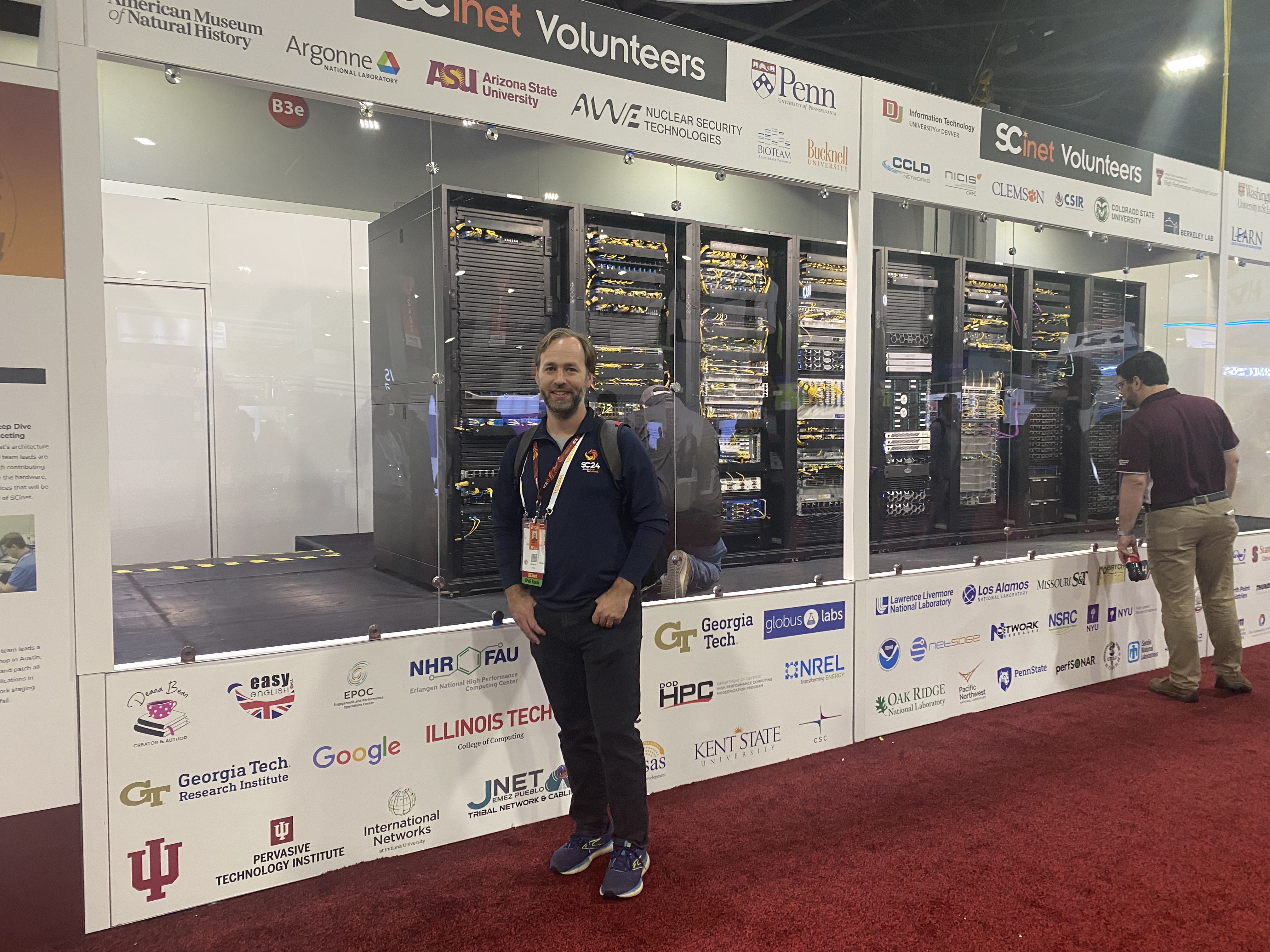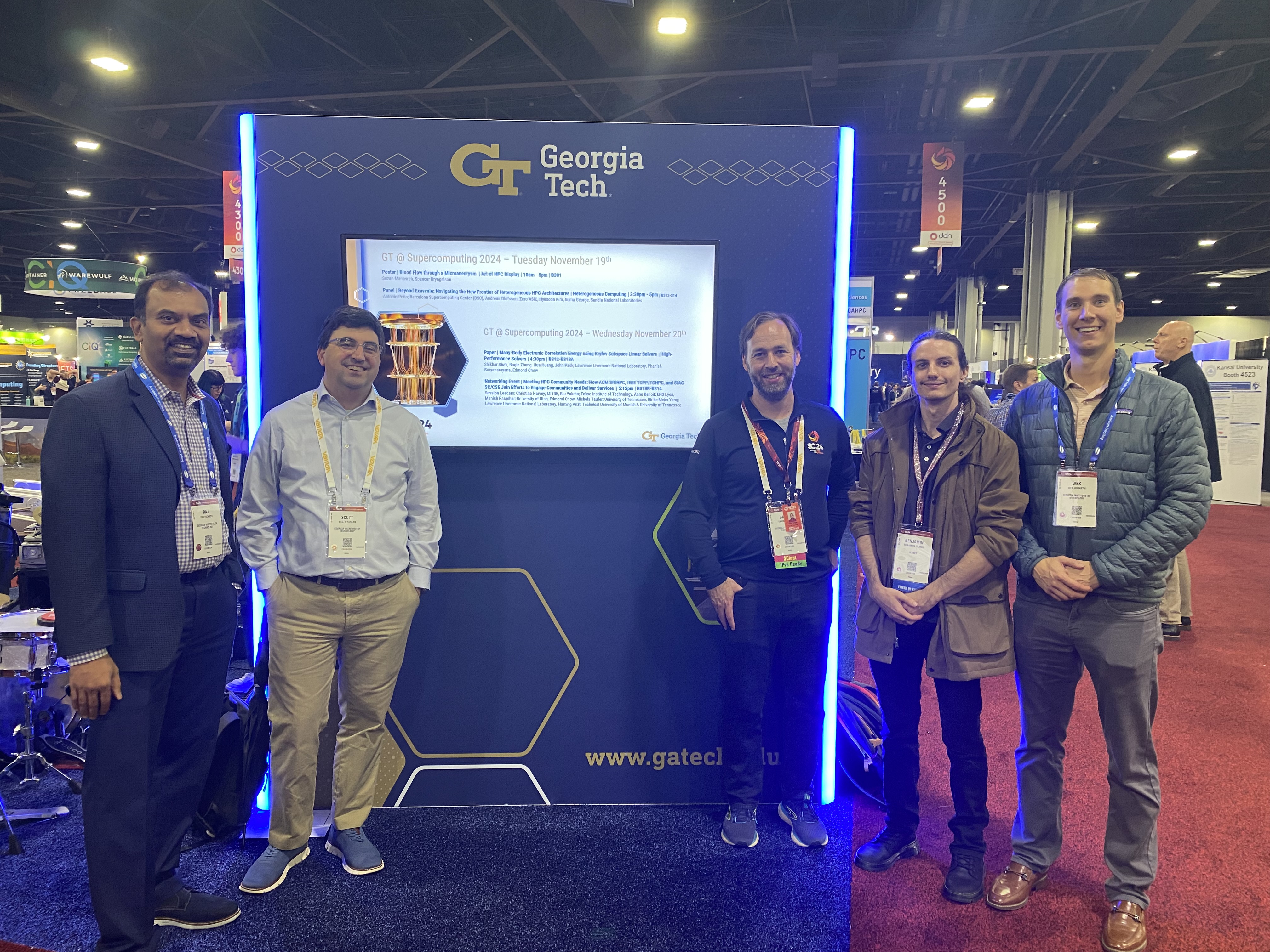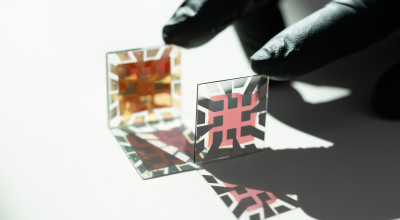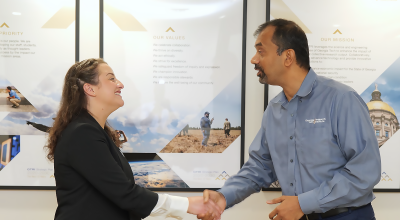
When thousands of computing professionals gathered in Atlanta for the SuperComputing 2024 (SC24) conference, held late last year, the seamless flow of data depended on an elite team of volunteers who built one of the world’s most advanced temporary networks.

Among those professionals was David Ediger, Ph.D., Chief of the High Performance Computing (HPC) Division within the Information Systems Department (ISD) at the Georgia Tech Research Institute (GTRI), who led a crucial component of the effort.
ISD develops, implements and maintains GTRI networking and communications. The ISD High Performance Computing Division operates high performance computing, storage, and networking infrastructure in support of sponsored research projects at GTRI.
At GTRI, Dr. Ediger leads research in high-performance computing applications across diverse fields, including weather prediction, climate science, medicine, drug discovery, nuclear physics, chemistry, materials science, cryptography, and machine learning. His participation in SCinet not only advances his own expertise but also strengthens GTRI’s role in shaping the future of high-performance computing.
SC24—the International Conference for High Performance Computing, Networking, Storage, and Analysis—is the premier global gathering for supercomputing experts.
The event, which has been held annually since 1988, draws more than 18,000 attendees, including researchers, scientists, computing industry professionals, and government stakeholders. The conference’s SCinet network—dubbed "the world’s fastest temporary network"—is a massive undertaking, built entirely by volunteers from across academia, industry, and research organizations.
“I have been involved with SCinet at SuperComputing since 2014, first as an experimenter testing GTRI technology, then as a participant on the Network Measurement team, and later as a team lead for the DevOps team,” said Ediger. “This was my second year as team lead. This year, the team comprised 19 volunteers from universities, national labs, research organizations, and industry partners.”
At SC24, volunteers deployed over 67,000 feet of fiber optic cable to construct a high-speed infrastructure capable of handling cutting-edge research and networking demonstrations. The result? A record-breaking peak bandwidth of 8.71 terabits per second (Tbps), powered by 30 wide-area network (WAN) circuits, including 18 at 400 gigabits per second (Gbps) and 450 access points spread throughout the venue.
Ediger’s team played a pivotal role in ensuring the network’s performance.
“The team is responsible for network measurement, monitoring, and all of the IT services that make up a network,” Ediger explained. “We operate domain name servers, web servers, print servers, identity management, source code repositories, configuration management, and virtualization infrastructure for all of SCinet and the SC committee.”

Beyond just providing connectivity, SCinet serves as a testbed for next-generation networking technologies. For the past two years, Ediger’s team has focused on advancing wireless IPv6 infrastructure, an important milestone in support of the Federal IPv6 Transition.
“SCinet has been a research presence at SuperComputing for over 25 years,” Ediger said. “It is a year-round effort to design and plan the network to meet the needs of attendees and research experimenters in the host city. Volunteers build the network in the month leading up to the conference and operate it for about a week. SCinet puts special emphasis on fielding and testing leading-edge technologies and ensuring vendor interoperability.”
For Ediger, his decade-long involvement in SCinet has provided unique insights into high-performance networking solutions—expertise he now applies to his leadership role at GTRI.
“The connections I have made with my counterparts at other institutions are an invaluable resource as we all try to push high-performance computing to the forefront,” he said. “There is truly nothing like building an enterprise network from the ground up each and every year, with a hard deadline and thousands of people depending on you.”
Writer: Christopher Weems
GTRI Communications
Georgia Tech Research Institute
Atlanta, Georgia
The Georgia Tech Research Institute (GTRI) is the nonprofit, applied research division of the Georgia Institute of Technology (Georgia Tech). Founded in 1934 as the Engineering Experiment Station, GTRI has grown to more than 2,900 employees, supporting eight laboratories in over 20 locations around the country and performing more than $940 million of problem-solving research annually for government and industry. GTRI's renowned researchers combine science, engineering, economics, policy, and technical expertise to solve complex problems for the U.S. federal government, state, and industry.



